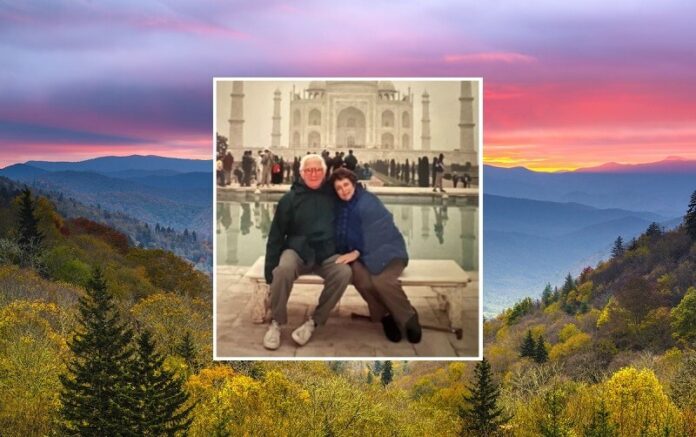Mr. Frank Leon Parker passed away on Wednesday, August 10, 2022, he was 96 years old.
Internationally renowned nuclear waste disposal expert and elected member of the U.S. National Academy of Engineering, Frank Parker was destined for a life of accomplishment, one could surmise, had they encountered him at his high school graduation in Somerville, Massachusetts. There, in 1943, stood a 6 foot 2 inch varsity football lineman and varsity basketball forward who, out of a class of 1,000 graduating high school students, took four of the seven academic honors presented to his class. Frank had already volunteered—enlisted in the Army—and had started classes at the Massachusetts Institute of Technology while waiting to be called up. Not bad for the 17 year old son of Ukrainian Jewish immigrants.
A true scientist, Frank was insatiably curious about everything. He went on to generate seminal works in what are now seven distinct disciplines, ranging from hydraulics to law to the scientific foundations of the environmental sustainability movement. Innovation and institutionalization of scientifically sound policies were his hallmarks and are his legacy, carried forward not only through his books and hundreds of peer-reviewed publications, not only through the innumerable committees and commissions he served on or led, but also through the generations of leaders in countries across the globe who earned their advanced degrees under him or received his guidance and philosophy. Among the Vanderbilt University community members who found Parker unforgettable are developer, engineer, and president of Bluebird Consulting and Mason Realty Investors Steve Mason; Engineering Endowed Director of Construction Management Professor Sanjiv Gokhale; Bob Waters of Sandia National Laboratories; Peter Jaffe of Princeton University; and Steve Hays of Gobble Hays Partners Inc.
Ranging from his home institution of Vanderbilt University, where he retired as Distinguished Professor Emeritus of Environmental Water Resources Engineering and Civil Engineering, and his home away from home in Vienna, Austria, where he spent time off and on from 1960 (at the United Nations’ International Atomic Energy Agency) to 2013 (at the International Institute for Applied Systems Analysis), Frank lent his time and talent to the biggest nuclear and radioactive waste concerns on the planet, taking time out from his consulting to the U.S., Swedish, Japanese, French, Italian, German, Swiss, Indian, Pakistani, and Russian governments to guest lecture and teach short courses from Oxford, England, to the University of Tennessee. He visited Moscow 30 times, beginning in 1964 at the height of the cold war.
In the case of Lee Company v. North Carolina Board of Transportation, 308 N.C. 603, 611-13 (N.C. 1983), Frank’s expert testimony and the monograph he provided to the court set the precedent that a land owner is responsible for the downstream (and upstream) effects of changes they make to the speed and volume of water discharged from their property. The case has been cited in more than 40 legal opinions.
Parker’s two reports while a senior research fellow of the Beijer Institute of the Royal Swedish Academy of Sciences were the only citations in the radioactive waste section of Madame Gro Harlem Brundtland’s pioneering 1987 United Nations report, Our Common Future. Brundtland established and was chair of the UN’s World Commission on Environment and Development, best known for developing the broad political concept of sustainable development. The recommendations led to the 1992 Earth Summit in Rio de Janeiro.
Parker was a member of the Scientific Advisory Council for the International Radioecology Laboratory, Slavutych (Chernobyl). He served as a lecturer at Christ College, Oxford, in a United Kingdom Atomic Energy Authority course and as a lecturer in the Italian Physics Society course on nuclear problems at Lake Como. He also was a senior research fellow of the International Institute for Applied Systems Analysis in Laxenburg, Austria.
Parker was elected to the National Academy of Engineering in 1988 for “world leadership in the development of the basic information required for safe disposal of high-level radioactive wastes”, the first from Vanderbilt and the only Vanderbilt member for 25 years. He presented invited papers at the Vatican’s Pontifical Academy of Sciences, the World Federation of Sciences annual meetings on Global Planetary Emergencies and the Blue Ribbon Commission on America’s Nuclear Future. He was a fellow of the American Association for the Advancement of Science and the first engineer elected by eminence to the American Academy of Environmental Engineers.
Parker served as the first head of Radioactive Waste Disposal Research for the International Atomic Energy Agency where he reached ambassadorial level. He served as head of the Radioactive Waste Disposal Research Section of Oak Ridge National Laboratory during his 10 years there, where his research was the first ecological study of riverine contamination conditions and the first pilot plant development of disposal of high-level radioactive wastes in geological strata, Project Salt Vault. When the Kansas salt mine repository for nuclear waste was authorized for investigation, Frank proposed that a set of experiments should be performed in situ. The results informed repository and container designs for nuclear waste disposal, institutionalized through standards and national regulations. Frank went on to teach and research at Vanderbilt University, continuing to lead policy study teams through the National Academy of Sciences / National Research Council as Chair of the Board of Radioactive Waste Management, member of BEST and Report Review Committee, among others, and to provide technical reviews of, among other nuclear facilities, the Savannah River Plant, Clinch River Breeder Reactor, and Hanford Reservation.
Frank was the third person to receive the 2003 Wendell D. Weart Lifetime Achievement in Nuclear Waste Management Award sponsored by Sandia National Laboratory. He was selected for the honor by the Waste Management Symposium Board, which cited his “long and productive service in pursuit of safe and technically sound solutions to the disposal of nuclear waste.”
From 1997 to 2005 Frank supervised an international collection of post-doctoral students in the summer institute and co-authored about two dozen publications of the International Institute for Applied Systems Analysis at the Laxenburg Palace in Vienna, Austria.
The Erice International Seminars are multidisciplinary seminars attended by over 100 eminent participants from all fields of science. Each year, a few scientific issues are selected and experts are invited to present contrasting views during the plenary multidisciplinary sessions of the seminar, followed by general debates. These sessions offer a unique opportunity for specialists to enlarge their fields of vision by being confronted to the ideas and suggestions from high level scientists in complementary domains of science. Associated workshops allow the experts to further refine and process the ideas evoked during the seminar. In 2010, working from first principles, Frank presented a nuclear fuel cycle without refined nuclear materials that, if adopted, would all but eliminate diversion to nuclear proliferation and would significantly reduce the problems associated with nuclear waste disposal.
Frank was unanimously chosen to receive the 2018 W. Bennett Lewis Award for Sustainable Energy and Development from the American Nuclear Society. The award recognizes those who have made major lifetime contributions in nuclear science and engineering toward minimizing environmental footprints and attaining long-term global sustainable energy and development. Parker was recognized for his contributions to global sustainable energy and “the safe and efficient management of nuclear waste through his leadership and untiring efforts during a lifelong career in research and teaching.”
While traveling with Russian military officials in their vehicle, on a secret base in western Russia, working to help them solve problems with nuclear submarine waste, Frank was detained for hours by the KGB; ordered to pay a fine; and released without incident. Upon release after hours of detention, Frank asked if there was someplace nearby where his party could get something to eat. The KGB commander lit up and smiled, and told him “there’s a great restaurant I just ate at,” then frowned, continuing sternly—“you can’t go there. You are going to be escorted out of the forbidden area.”
Jack Daniel’s drinkers can rejoice in the knowledge that the water supply for this Tennessee sipping whiskey is assured, thanks in part to work by Frank Parker. The Jack Daniel Distillery purchased the 250 acres that feed its single source of water after scientific studies in the 1980s. Frank answered the question that others could not—what was the source of the water that emerged in the Cave Spring Hollow?
Married for 67 years to the love of his life, the beautiful and accomplished Elaine Parker, Frank traveled with her to some 60 countries, from the fjords of Nordkapp to the Cape of Good Hope and Cape Horn, Australia to Argentina. While working in Siberia, he took colleagues on the weekend to Lake Baikal. It helped that his wife Elaine was a gourmet cook who, like his colleagues, was also interested in touring and eating adventurously. Frank and Elaine hiked and camped with their children all over the southern United States and in the intermountain west and northwest. Elaine passed in October 2021.
Frank played on the Somerville, Massachusetts, high school varsity basketball team where all five players in the starting lineup were over 6 feet tall—in 1943. He also started as a lineman for the Somerville High School football team. His high school football team scrimmaged with the MIT football team—and beat MIT. The only game MIT usually had was freshman versus sophomores. They would scrimmage with local high schools in preparation for that big game.
While squash was his preferred game, it was hard to find enough challenging players locally, so Frank switched to racquetball. He was in his 70s, playing racquetball with one of his graduate students, when one of his undergraduates playing in a nearby court challenged him to a game of doubles. Frank consulted his graduate student—did they want to take on the captain of the football team and one of his teammates? They did and won. The footballers couldn’t believe it and asked for a rematch—which Frank and his grad student also won.
Frank went cross-country skiing for the first time when he was 80, encountering a herd of wild bison on the Lone Star Geyser trail in Yellowstone National Park. You should see the video!
When wrapping up the Swedish project, he went with Elaine and one of his sons by train to the northern tip of Norway and took the classic Hurtigruten coastal boat servicing the isolated fjord towns during midsummer. There were few tourists. Elaine, having had her fill of seeing fjords, sought and was welcomed into the galley. Frank said the food served on the boat improved!
Frank was blessed with four children, Nina (Parker) Ganz, Aaron, Stephan, and David, together with five grandchildren and three great-grandchildren and many loving nieces, nephews, grandnieces and grandnephews. He is survived by his brother Gerald and preceded in death by his brother Arnold.
Services to be held at Congregation Micah on Sunday, August 14, at 1 pm. Memorials may be made in honor of Frank Parker to the Jewish Family Service of Nashville.
Fond memories and expressions of sympathy may be shared at www.marshalldonnellycombs.com for the PARKER family.
For more obituaries visit https://davidsoncountysource.com/obituaries/




















